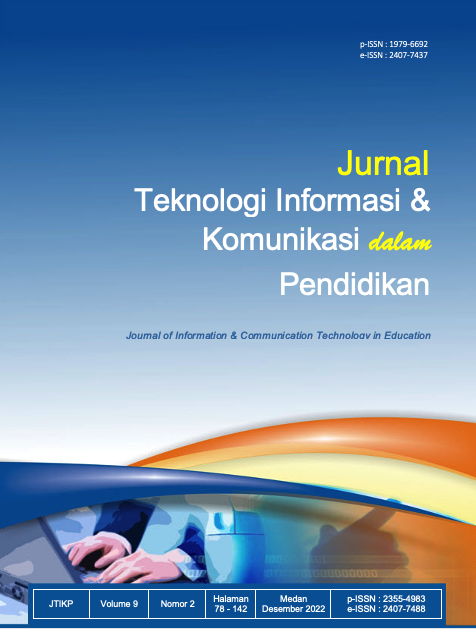PENINGKATAN KOMPETENSI KEWIRAUSAHAAN MELALUI PEMBELAJARAN BERBASIS PROJEK BERBANTUAN TEKNOLOGI INFORMASI DAN KOMUNIKASI
DOI:
https://doi.org/10.24114/jtikp.v9i2.41939Abstract
Abstrak: Tuntutan revolusi industri merubah tatanan dalam berbagai bidang, baik ekonomi, sosial dan pendidikan khususnya. Penerapan teknologi informasi dan komunikasi menjadi ciri utama pada era digital ini. Penelitian ini bertujuan meningkatkan kompetensi mahasiswa dalam berwirausaha melalui pembelajaran berbasis projek berbantuan teknologi informasi dan komunikasi. Penelitian menggunakan disain eksperimen dengan membagi tiga kelompok responden yakni kelompok pembelajaran konvensional (X0) sebagai kelompok kontrol dan dua kelompok eksperimen yakni pembelajaran berbasis projek (X1) dan pembelajaran berbasis projek berbantuan TIK (X2). Analisis data menggunakan teknik komparasi dengan Twoway-Anova. Hasil Penelitian membuktikan bahwa pembelajaran kewirausahaan berbasis projek lebih efektif dibanding pembelajaran dengan pendekatan konvensional, dan pembelajaran berbasis projek berbantuan TIK lebih unggul dari pembelajaran berbasis projek (µ2> µ1> µ0). Temuan penelitian ini memperkuat penelitan terdahulu dan merekomendasikan pemanfaatan teknologi informasi dan komunikasi dalam pembelajaran khususnya dalam bidang kewirausahaan. Kompetensi hasil belajar akan lebih tinggi pada pembelajaran berbasis projek berbantuan TIK dibanding model pembelajaran lainnya, seiring dengan tuntutan perilaku bisnis dan kewirausahaan di era digital saat ini.Kata Kunci: Kewirausahaan, PBL, TIK Abstract: The demands of the industrial revolution changed the order in various fields, both economic, social and education in particular. The application of information and communication technology is the main characteristic of this digital era. This study aims to improve student competence in entrepreneurship through project-based learning assisted by information and communication technology. The study used an experimental design by dividing three groups of respondents namely the conventional learning group (X0) as the control group and the two experimental groups namely project-based learning (X1) and ICT-assisted project-based learning (X2). Data analysis uses a comparison technique with Twoway-Anova. The research results prove that project-based entrepreneurship learning is more effective than learning with conventional approaches, and ICT-assisted project-based learning is superior to project-based learning (µ2> µ1> µ0). The findings of this study strengthen previous research and recommend the use of information and communication technology in learning, especially in the field of entrepreneurship. Learning outcomes competence will be higher in ICT-assisted project-based learning compared to other learning models, in line with the demands of business and entrepreneurial behavior in the current digital era.Keywords: Entrepreneurship, PBL, ICTReferences
Brad Hokanson (2018). Developing Creative Thinking Skills. New York, Taylor and Francis
Clark, R., and Mayer, R.E. (2011). E-Learning and the science of instruction (2nded.), J. Wiley inc.
Ellingsen, P., Tonholm, T., Johansen, F.R., Andersson, G. (2021). Learning from Problem-Based Projects in Cross-Disciplinary Student, Teams. Education Science, 11(259), 1-15, https://doi.org/10. 3390/educsci11060259
Galen A. Foresman, ŽPeter S. Fosl, ŽJamie C. Watson (2017). The Critical Thinking Toolkit. West Sussex, UK, John Wiley & Sons, Inc.
Jonathan Haber (2020). Critical Thinking. Massachusetts Institute of Technology. https://mitpress.mit.edu/books/critical-thinking
John Almarode, ŽKara Vandas. (2018). Clarity for Learning: Five Essential Practices That Empower Students and Teachers. New Delhi, CORWIN.
Kekang He. (2017). A Theory of Creative Thinking: Construction and Verification of Dual Circulation Model. BI University, Springer
Krieg, E. J. (2020). Statistics and Data Analysis For Social Science (2nd Eds.). SAGE Publications, Inc., Singapore. ISBN: 9781544352657
Mila Steele. (2018). Critical Thinking. California, SAGE Publication Ltd.
Naveen K., and Jyoti, K. (2019). Efficiency 4.0 for industry 4.0, Human Technology, 15(1), pp. 55-78.
Ostashewski, N., Howell, J., & Dron, J. (2016). Crowdsourcing MOOC Interactions: Using a Social Media Site cMOOC to Engage Students in University Course Activities. http://oasis.col.org/handle/11599/2528
Rakib, M. (2020). Factors Influencing Work Performance of Graduates in Indonesia, Talent Development & Excellence, 12(1), 3292 “ 3301.
Saputra, H., & Marcelawati , Y. (2020). Analisis Ruang Percepatan: Dinamika Pendidikan Di Era Pandemi Covid 19. RESIPROKAL: Jurnal Riset Sosiologi Progresif Aktual, 2(2), 160-174. https://doi.org/10.29303/ resiprokal.v2i2.43
Siti Martiah (2017). Kewirausahaan Berbasis Teknologi (Technopreneurship) dalam Perspektif Ilmu Pendidikan. Jurnal lmiah Edutic, 3(2), 75-82. DOI:10.21107/edutic. v3i2.2927
Tapi Rondang Nibulan (2015). Pemanfaatan Metode Kontekstual Dalam Pembelajaran Kewirausahaan Guna Peningkatan Intensi. Prosiding Nasional Forum Manajemen Indonesia 7. ISBN 978-602-73177-0-3, https://fmi.or.id/fmi-2015-jakarta/
Tapi Rondang Nibulan & Pitono (2014). Menumbuh kembangkan Intensi Kewirausahaan Mahasiswa Melalui Model Pembelajaran Kontekstual. Proceedings Forum Manajemen Indonesia 6. ISSN 2407-0548, https://fmi.or.id/fmi-2014-medan/
Teo Yang Kiat., Jumintono., Erwin, S.K., ¦ and Rofik, M. (2020). The effectiveness of multimedia learning in academic achievement in reproduction topic science subject. Universal Journal of Educational Research, 8(8), 3625“3629. https://doi.org/10.13189/ujer.2020.080839
Zeeshan, B., Ahsan., Abdul, R.G., and Mostafa, K. (2017). Be-educated: multimedia learning through 3D animation, International Journal of Computer Science and Engineering, 1(1), 13-22.




